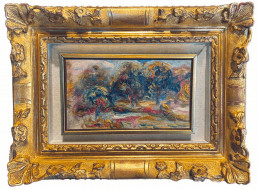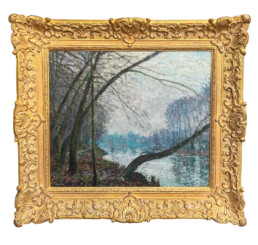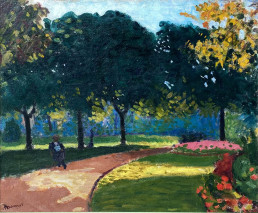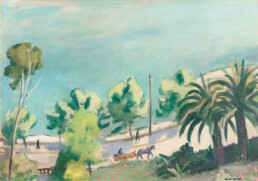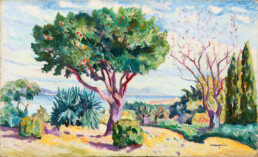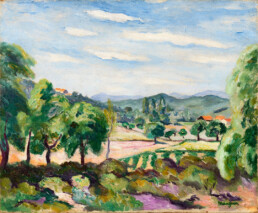Rediscovering French horizons: a journey from Impressionism to Postimpressionism.
Galerie Hurtebize is proud to present its exhibition, “French Landscapes : Impressionnism and Postimpressionnism“, offering a fascinating immersion in French landscapes as interpreted by the emblematic figures of these artistic movements. As we celebrate the 150th anniversary of Impressionism, our exhibition takes on a special resonance. A century and a half ago, a group of daring painters broke with convention to explore new ways of capturing the moment on canvas, giving birth to what would come to be recognized as one of the greatest artistic revolutions in history.
This exhibition is a vibrant tribute to a movement that changed the course of art forever. It invites visitors to contemplate works that continue to embody the spirit of innovation and freedom of expression that animated these revolutionary artists. As you browse through the exhibition, you’ll feel the effervescence of that seething period, when every brushstroke testified to a passionate quest to capture the ephemeral.
Our collection is a celebration of the diversity and richness of the French landscape, and a recognition of its central role in the development of these two movements that had a lasting impact on the world art scene.
Works by Pierre-Auguste Renoir, Alfred Sisley, Albert Marquet, Henri Manguin, Henri Martin and others interact within the exhibition, offering a rich and diverse representation of the French landscape. They celebrate land, water and sky, capturing with a personal touch the beauty of France that continues to fascinate and inspire.
It is with great pleasure that we open our doors to reveal canvases where nature is sometimes gentle and soothing, sometimes lively and tumultuous. The works selected for this exhibition celebrate the splendor of the countryside, the poetry of villages and the wildness of the French coastline.
Lumières Fugitives: When the Impressionists Painted the Moment
Pierre-Auguste Renoir the master of light
The masters of Impressionism, such as Pierre-Auguste Renoir with his famous “Maison Blanche”, revolutionized the perception of light and color, opting for rapid, colorful strokes that capture the essence of the moment. The work presented here, “Paysage“, depicts a view of the olive groves of Cagnes-sur-Mer, a vibrant testimony to the last years of the artist’s life. Renoir, in search of light and warmth for his old age, had settled in the south of France, and it was here, in the heart of luminous Provence, that he captured the immortal beauty of his olive groves at the Domaine des Collettes. The work is a whirlwind of vivid color and movement, where the brush dances and plays with light, evoking the warm breeze of a Mediterranean afternoon. The palpable texture of the paint and the spontaneity of the brushstrokes suggest an artist in full communion with his environment, capturing the vibrant essence of twisted trees and the generous earth that nourishes them. Through these almost abstract forms, we can feel the deep and lasting impact that nature and this particular corner of France have had on the artist.
Alfred Sisley, the pure Impressionist
Alfred Sisley‘s “Matinée d’Octobre près du Port-Marly” is a gentle, melancholy view of a river landscape, with trees leaning gracefully over the water, bathed in the morning mist of early autumn. His work captures the transient essence of light and atmosphere with a subtlety that is the hallmark of the great Impressionist masters. This work by Alfred Sisley is interesting for its location, the town of Port-Marly, at the heart of the artist’s creation. Its counterpart is on show at the Städel Museum in Frankfurt am Main, Germany.
Albert Marquet and the beginnings of Post-Impressionism
Albert Marquet, known for his views of the port of Saint-Tropez, captures the reflections and changing nuances of the water with finesse. “La Route de l’Estaque” and his “Jardin du Luxembourg” scene bring a more structured, colorful perspective, typical of the evolution towards Post-Impressionism. He balances form and color, creating scenes that are both immediate and timeless. Marquet gives us urban and coastal landscapes tinged with a poetic tranquility, a distinct luminous quality that reflects the serenity of a scene from everyday life.
Colors and contours: The vibrant legacy of the Postimpressionists.
Henri Martin and his free pointillist style
Alongside them are the postimpressionists, whose work, at the heart of Henri Martin‘s “Printemps à la Bastide du Vert” exhibition, shimmers with timeless grace, inviting contemplation. This artist, less popular than his Impressionist counterparts but just as captivating, brought Post-Impressionism to a lyrical and intimate scale. The painting presented here, a depiction of the Bastide du Vert, captures with poetic delicacy the church and poplars that stand like sentinels around the village, under a light that seems to pulsate with the rhythm of rural life. Martin’s technique, with its pointillist strokes and rich palette, transports us into an atmosphere imbued with tranquility. It’s not just technical skill that reveals itself before our eyes, but a deep understanding and love of the French countryside that manifests itself in every part of the canvas. Martin, with his unique ability to translate the peaceful majesty of the landscapes of south-western France, offers us an almost ethereal vision of nature. His work is a call to feel the harmony that emanates from the fields, trees and old stone walls of these places he so cherished.
Henri Manguin and the colorful exuberance of Fauvism
The exhibition would not be complete without the work of Henri Manguin, an outstanding colorist who followed in the footsteps of the Fauvists with his own sensibility. The year 1921 saw the birth of his work “Paysage autour de Gassin“, a vibrant summer canvas, where warm hues and deep shadows tell the story of a Provence both wild and domesticated. A few years later, in 1925, Manguin paid tribute to the beauty of the Côte d’Azur with “Vue sur le Golfe de Saint-Tropez“. This piece captures the essence of a region bathed in light, where sky and sea embrace in a harmony of blues and greens, punctuated by the reds and yellows of the trees and flowers that adorn this coastal landscape. These two paintings testify to Manguin‘s talent for immortalizing the subtle nuances of southern light. Contemplating them, you can almost feel the warmth of the Mediterranean sun and the scent of pine trees. Their presence in the exhibition offers a fluid transition between the softness of Impressionism and the colorful exuberance of Fauvism, showing how French landscapes continued to inspire and transform art, even after the Impressionist era.
We invite you to let yourself be carried away by this pictorial odyssey. Observe how landscape transcends its simple representation to become a vehicle of emotion and expression. It is a universal language, an adventure in perception where the canvas becomes a meeting place between the viewer and the artist’s inner vision.
Franch Landscape: Impressionnism and Postimpressionnism opens up a silent but powerful dialogue between works and visitors. The gallery awaits you for a unique experience that promises to enrich your understanding of art and make you see France in a new light.
The Galerie Hurtebize team looks forward to seeing you.

Céline Fernandez
With 15 years' experience in marketing and communications, Céline has worked for major companies such as Public Système, Groupe Galerie Lafayette and several communications agencies. For over 4 years, she has been managing the gallery's communications through the website, social networks and traditional media.


